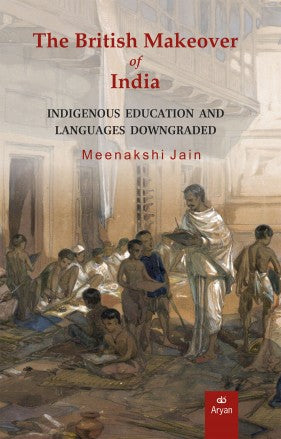THE BRITISH MAKEOVER OF INDIA: Indigenous Education and Languages Downgraded (Releasing on 10th February, 2025)
THE BRITISH MAKEOVER OF INDIA: Indigenous Education and Languages Downgraded (Releasing on 10th February, 2025) is backordered and will ship as soon as it is back in stock.
Couldn't load pickup availability
Genuine Products Guarantee
Genuine Products Guarantee
We guarantee 100% genuine products, and if proven otherwise, we will compensate you with 10 times the product's cost.
Delivery and Shipping
Delivery and Shipping
Products are generally ready for dispatch within 1 day and typically reach you in 3 to 5 days.
- Type: English
- Pages: 408
- Format: Hard Bound
- ISBN: 9788173057205
- Edition: 1st
- Publisher: Aryan Books International
- Size: 15 cm x 23 cm
- Product Year: 2025
Long centuries before the Common Era, the commitment, continuity, and participation in the transmission of indigenous knowledge was apparent from several sources. An early important agency for the communication of literal and specialized education was the family. There were also references to teachers of noble character, gurus, who imparted knowledge in their ashrams. Later, the presence of organized institutions could be gleaned from temple colleges and mathas of acharyas.
At the beginning of the nineteenth century, indigenous systems of education were in a reasonably good state. British educational surveys, beginning with that of the Madras Presidency under the direction of Governor Thomas Munro, confirmed that.
The colonial state made systematic attempts to undermine the self-sufficient indigenous education systems. Interestingly, a blueprint for the Christianization and Anglicization of India was presented as early as 1792 by the Evangelical, Charles Grant. Thomas B. Macaulay implemented the scheme some four decades later.
While most Company officials in India emphasized the need to retain indigenous vernacular systems, a small group in London and Calcutta pressed for English education. Complicating matters was the growing presence of missionaries, and their determination to proselytize. The Indian resistance to the blandishments of the Company and missionaries was the true story of education in colonial times.
Alongside was the battle against Persian and Urdu by proponents of Hindi, who regarded it as the bearer of indigenous cultural heritage. They viewed the promotion of Persian and Urdu as “the total displacement of the national and traditional for one which is strange, foreign, and uncongenial.”





